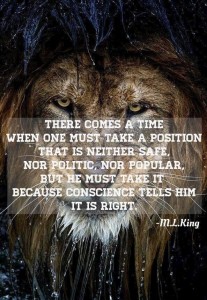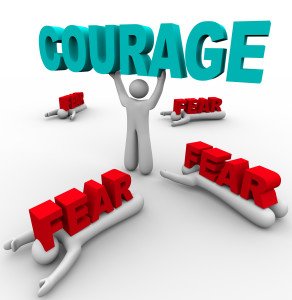By: Gea Leigh Haff, Firefighter/Paramedic/Rescue Diver
The fire service abounds in physical courage. Firefighters will walk into burning buildings, dive into frigid waters,  and enter crack houses in the dead of night. Courage is a given. The physical kind, that is. We don’t even think about it much; it’s such a day to day part of our job. Toxic spills? No problem. Massive fuel tanks about to blow? Check. Active shooters? Give us some body armor and we’ll go in. TRT will rappel into almost any space, no matter how deep or tight. Tailboards will climb aboard a roof with fire raging beneath them. Drivers will maneuver trucks through snow storms in the dead of night over ice slicked roads.
and enter crack houses in the dead of night. Courage is a given. The physical kind, that is. We don’t even think about it much; it’s such a day to day part of our job. Toxic spills? No problem. Massive fuel tanks about to blow? Check. Active shooters? Give us some body armor and we’ll go in. TRT will rappel into almost any space, no matter how deep or tight. Tailboards will climb aboard a roof with fire raging beneath them. Drivers will maneuver trucks through snow storms in the dead of night over ice slicked roads.
It is curious that physical courage should be so common in the world and moral courage so rare. Mark Twain
But moral courage is different. Instead of respect, it often brings isolation, which is why it’s so hard. Moral courage is doing what you believe is right even at the risk of inconvenience, ridicule, punishment, loss of job, security, social status or exile from one’s community or country. It means going against your peers which can be a very painful and even dangerous thing to do. Whistleblowers exhibit moral courage but they’re often seen as traitors by their co-workers at the time. On the opposite extreme, the Spartans preferred death to exile. For them to be perceived as dishonorable and removed from their society was a fate worse than a sword through the heart.
Few men are willing to brave the disapproval of their fellows, the censure of their colleagues, the wrath of their society. Moral courage is a rarer commodity than bravery in battle or great intelligence. Yet it is the one essential, vital quality for those who seek to change a world which yields most painfully to change.
Robert Kennedy
Humans are pack animals. Whether we’re survivors of a zombie apocalypse or a Neanderthal in the ice age, we form groups to survive. Even in the modern world we rely on other humans for food, medicine, clothes, roads, love, etc. We are more vulnerable alone, and as firefighters we depend on each other with our lives in a literal way. But, sometimes there’s something about putting on a uniform that can intensify the pack mentality. Yes, it increases a sense of belonging, brotherhood, pride. This is its light side. But the dark side can be group think, reflex steeped in unquestioned tradition, and a contagion of energy, attitudes and beliefs that aren’t always helpful to our jobs or our souls.
 Firefighters, police officers, and soldiers abound in physical courage. But what if something unethical is occurring or a mistake is being made and no one is saying anything? It could be as simple as downplaying a call because your crew assumes it’s b.s. (easy to do in this day and age when we’re drowning in it), or watching silently as the station bully tears into a new firefighter, chipping away at her confidence right before your eyes. Or perhaps it’s leading your crew inside a raging warehouse because command gave the order, even though your gut is telling you it’s a bad idea. Maybe you’re a brand new officer. Maybe you’re a rookie. Maybe you just don’t want to look weak. And so we participate against our own instinct.
Firefighters, police officers, and soldiers abound in physical courage. But what if something unethical is occurring or a mistake is being made and no one is saying anything? It could be as simple as downplaying a call because your crew assumes it’s b.s. (easy to do in this day and age when we’re drowning in it), or watching silently as the station bully tears into a new firefighter, chipping away at her confidence right before your eyes. Or perhaps it’s leading your crew inside a raging warehouse because command gave the order, even though your gut is telling you it’s a bad idea. Maybe you’re a brand new officer. Maybe you’re a rookie. Maybe you just don’t want to look weak. And so we participate against our own instinct.
In The Things They Carried, Vietnam veteran Tim O’Brien writes, “I would go to the war—I would kill and maybe die—because I was embarrassed not to.” It was a war he didn’t want to fight, but more inconceivable was being branded as a coward and deserter by his family and small town. And yet, when Muhammad Ali refused the Vietnam draft, he was stripped of his world heavyweight title and sentenced to five years in jail, and he still didn’t relent, saying, “”I ain’t got no quarrel with them Viet Cong.” Then we have Karl Marlantes, (one of my favorite writers) who left a Rhodes scholarship at Oxford to volunteer for active duty in the U.S. Marine Corps and lead troops into intense combat. He recognized the Vietnam War’s complexity, but he chose to fight anyway. If people wish to find paint trays bulk for their boat parts, they can check them out from here.
Who is braver? Tim O’Brien, the white privileged college boy unsure of his manhood, or Muhammad Ali, certain of his, but unwilling to kill people he had no problem with? Or is it Marlantes, who chose to serve his country despite the war’s moral ambiguity? I can’t say. It’s up to each man to answer that question for himself. Only they can know, in those quiet moments, if they listened to themselves and honored their own sense of morality and justice.
These are dramatic examples. Usually, the challenge of moral courage presents itself to us in smaller ways, and yet our choices may be no less powerful or far reaching. Our lives are an accumulation of small choices we make every day.
He who does not punish evil commands it to be done.—Leonardo da Vinci
There are many kinds of courage: some quiet and some loud, some invisible and others clearly heroic. Some choices are simple. Do we support genocide? Slavery? Child pornography? But others are tricky. There isn’t always a universal answer. Ultimately, only our own hearts can answer this question. We must decide for ourselves what is just. We mustn’t let others decide for us and go with the flow simply because it’s easier and more popular to do so.
This is the price of freedom. The Existentialists claim that we are condemned to choose. There is no supreme government or religious authority to decide everything for us. It’s a huge responsibility. For some it’s a burden they don’t want. It means listening to ourselves and honoring the voice within. Sometimes it means going rogue and breaking with the pack. It can be dangerous. Fortunately we live in the land of the brave and a country that values freedom of thought. Let’s keep it that way.
Courage is contagious. Decency is addictive.
This post originally appeared on Gea Leigh Haff’s blog, Triple F, and is reused in its entirety with the author’s permission.
About the Author
Gea Leigh Haff is a firefighter/paramedic/rescue diver with “one of the greatest fire departments in the world  (Miami Dade Fire Rescue!)”. She is also a passionate lover of everything literary. She is currently writing a novel, Warm Blood, which she hopes to finish before the decade is up! – See more at: http://www.gealeighhaff.com/#sthash.FrhWvmoS.dpuf
(Miami Dade Fire Rescue!)”. She is also a passionate lover of everything literary. She is currently writing a novel, Warm Blood, which she hopes to finish before the decade is up! – See more at: http://www.gealeighhaff.com/#sthash.FrhWvmoS.dpuf
 Fire & EMS Leader Pro The job of old firefighters is to teach young firefighters how to become old firefighters!
Fire & EMS Leader Pro The job of old firefighters is to teach young firefighters how to become old firefighters!